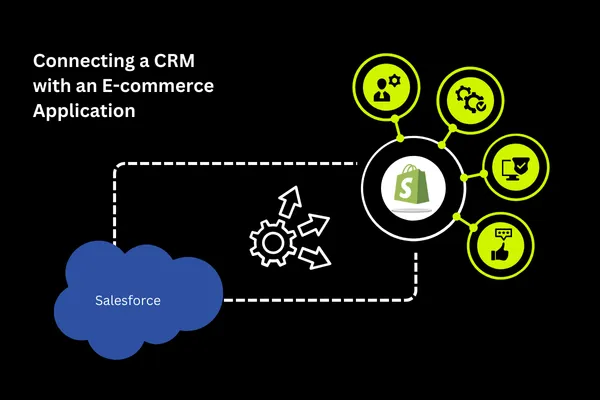Our Blogs
Lorem ipsum dolor sit amet, consectetuer adipiscing elit. Aenean commodo ligula eget dolor. Aenean massa. Cum sociis natoque penatibus et magnis dis parturient montes, nascetur ridiculus mus.

Connecting a CRM (SalesForce) and E-Commerce system (Shopify) for Seamless Data Flow
In today’s digital landscape, businesses are increasingly reliant on multiple software solutions to manage various aspects of their operations. Two of the most common systems used are Customer Relationship Management (CRM) applications and e-commerce platforms. Integrating these systems through APIs can significantly enhance business efficiency by ensuring seamless data flow and improving decision-making processes. In this article, we’ll explore the importance of API integrations, how they work, and the benefits they bring to businesses. Today, 95% of decision makes say they use APIs.
Understanding API Integrations
An API, or Application Programming Interface, is a set of rules and protocols that allows different software applications to communicate with each other. APIs act as bridges between disparate systems, enabling them to share data and perform functions seamlessly. When it comes to integrating a CRM and an e-commerce platform, APIs facilitate the transfer of information such as customer details, orders, inventory levels, and more.
Why Integrate CRMs with E-Commerce Platforms?
Integrating a CRM with an e-commerce platform provides several advantages, including:
Centralized Customer Data: APIs enable the automatic synchronization of customer data between the e-commerce site and the CRM. This means that when a customer makes a purchase, their information is immediately updated in the CRM, providing sales and support teams with real-time access to the latest customer details.
Enhanced Customer Experience: By integrating these systems, businesses can offer a more personalized and consistent customer experience. For example, sales teams can access purchase histories and tailor their communications to meet individual customer needs.
Streamlined Operations: Integration eliminates the need for manual data entry and reduces the risk of errors. Automated data flow ensures that inventory levels, order statuses, and customer interactions are accurately reflected across both systems.
Improved Marketing Efforts: With access to comprehensive customer data, marketing teams can create more targeted and effective campaigns. They can segment customers based on purchase behavior and tailor promotions to specific groups, driving higher engagement and conversion rates.
How API Integrations Work
To integrate a CRM and an e-commerce platform, developers typically follow these steps:
Identify Requirements: Determine the specific data and functions that need to be shared between the systems. This could include customer data, orders, product details, and more.
Choose the Right APIs: Most platforms often provide their own APIs. Developers need to choose the right APIs to facilitate the required data exchanges.
Develop the Integration with Software Endpoints: Using the chosen APIs, developers write the necessary code to establish communication between the systems. This may involve creating endpoints, handling data transformations, and ensuring data security.
Test and Optimize: Thorough testing is essential to ensure the integration works as intended. There are many tools available online to test API integrations, with one of the most popular being Postman. Developers should test data synchronization, error handling, and performance. Once tested, the integration can be optimized for speed and reliability.
Real-World Example
Consider a retail company using Salesforce as its CRM and Shopify as its e-commerce platform. By integrating these systems through APIs, the company can automatically update customer profiles in Salesforce with each new order placed on Shopify. This integration provides sales representatives with up-to-date information about customer purchases, enabling them to offer personalized recommendations and support.
Conclusion
API integrations between a CRM and an E-commerce platform are crucial for businesses seeking to streamline operations and enhance customer experiences. By enabling seamless data flow, these integrations empower companies to make informed decisions, improve marketing efforts, and provide personalized service. As businesses continue to embrace digital transformation, mastering API integrations will become an essential skill for driving growth and success.
Stay in the know by Adrian's Trends Blog:
https://ansoftwareservices.com/trends
References
https://developer.salesforce.com/docs/einstein/genai/references/models-api?meta=Summary
Frequently Asked Questions
Q:
Lorem ipsum dolor sit amet, consetetu sadipscing elitr, sed diam nonumy!
Lorem ipsum dolor sit amet, consetetur sadipscing elitr, sed diam nonumy eirmod tempor invidunt ut labore et dolore magna aliquyam erat, sed diam voluptua. At vero eos et accusam et justo duo dolores et ea rebum. Stet clita kasd gubergren, no sea takimata sanctus est.
Q:
Lorem ipsum dolor sit amet, consetetu sadipscing elitr, sed diam nonumy!
Lorem ipsum dolor sit amet, consetetur sadipscing elitr, sed diam nonumy eirmod tempor invidunt ut labore et dolore magna aliquyam erat, sed diam voluptua. At vero eos et accusam et justo duo dolores et ea rebum. Stet clita kasd gubergren, no sea takimata sanctus est.
Q:
Lorem ipsum dolor sit amet, consetetu sadipscing elitr, sed diam nonumy!
Lorem ipsum dolor sit amet, consetetur sadipscing elitr, sed diam nonumy eirmod tempor invidunt ut labore et dolore magna aliquyam erat, sed diam voluptua. At vero eos et accusam et justo duo dolores et ea rebum. Stet clita kasd gubergren, no sea takimata sanctus est.
Q:
Lorem ipsum dolor sit amet, consetetu sadipscing elitr, sed diam nonumy!
Lorem ipsum dolor sit amet, consetetur sadipscing elitr, sed diam nonumy eirmod tempor invidunt ut labore et dolore magna aliquyam erat, sed diam voluptua. At vero eos et accusam et justo duo dolores et ea rebum. Stet clita kasd gubergren, no sea takimata sanctus est.
Get in touch with us
We’re here to help you every step of the way. Whether you have questions about our HRIS solutions, need support, or want to learn more about how Reframe can transform your HR processes, we’d love to hear from you.
Our dedicated team is ready to assist with any inquiries and provide the information you need to make informed decisions. Connect with us through our contact form, email, or phone, and let’s start the conversation on how we can support your business success.
Tell Us How We Can Help You
Navigation
Services
Legal Pages
© Copyright 2025. REFRAME.
All rights reserved.

